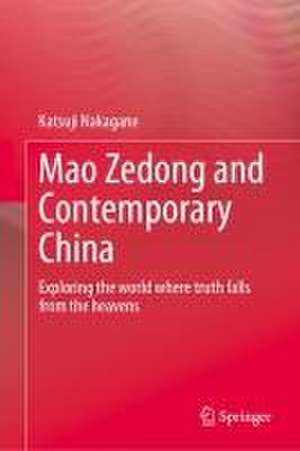Mao Zedong and Contemporary China: Exploring the World Where Truth Falls from the Heavens
Autor Katsuji Nakaganeen Limba Engleză Hardback – 12 mai 2024
Preț: 644.82 lei
Preț vechi: 848.44 lei
-24% Nou
Puncte Express: 967
Preț estimativ în valută:
123.40€ • 128.05$ • 103.14£
123.40€ • 128.05$ • 103.14£
Carte tipărită la comandă
Livrare economică 12-18 martie
Preluare comenzi: 021 569.72.76
Specificații
ISBN-13: 9789819717606
ISBN-10: 9819717604
Pagini: 261
Ilustrații: XXIII, 261 p. 20 illus.
Dimensiuni: 155 x 235 mm
Greutate: 0.61 kg
Ediția:2024
Editura: Springer Nature Singapore
Colecția Springer
Locul publicării:Singapore, Singapore
ISBN-10: 9819717604
Pagini: 261
Ilustrații: XXIII, 261 p. 20 illus.
Dimensiuni: 155 x 235 mm
Greutate: 0.61 kg
Ediția:2024
Editura: Springer Nature Singapore
Colecția Springer
Locul publicării:Singapore, Singapore
Cuprins
Mao’s philosophy and thought: tricks inherent in his philosophy “On Contradiction” and “On Practice”.- If Lu had lived even in post-revolution China?.- Class struggle theory and mass line: Mao’s basic understanding of Marxism.- Anti-rightist movement launched by Mao and its aftermath: Historical turning-point.- The Great Leap Forward and the Great Famine.- Tragedy of Peng Dehuai who criticized Mao: Lushan Conference and its aftermath.- Mao’s political economics: anatomy of his “economics of contradiction”.- The Cultural Revolution and Mao Zedong: mechanism of the turmoil
Notă biografică
Katsuji Nakagane is a professor emeritus of The University of Tokyo. He also taught at Hitotsubashi University and Aoyama Gakuin University. He obtained his Ph.D. in international economics at The University of Tokyo in 1992. He was formerly president of the Japan Association of Asian Studies, president of the Japan Association of Comparative Economics Studies, president of the Japan Association of Chinese Economic and Management Studies, and editor-in-chief of the Developing Economies. He has published several books on the Chinese economy, development economics and systemic transition in Japanese, such as Studies on the Chinese Economy (University of Tokyo Press, 1992), Studies on the Development of the Chinese Economy (Yuhikaku, 1999), The Political Economy of Systemic Transitions (Nagoya University Press 2010), Contemporary China and Development Economics (Nagoya University Press,2012), and Mao Zedong—The Truth Falls Down from Heaven (Nagoya University Press, 2021). Most recently he edited the English language book Studies on the Chinese Economy During the Mao Era (Springer, 2023).
Textul de pe ultima copertă
What did Mao Zedong bring to China? Mao Zedong, a rare leader who is still regarded as a great hero on the Chinese continent, despite the large number of victims caused by the Great Leap Forward and the Cultural Revolution. He called himself "Qin Shi Huang (First Emperor of Qin)plus Marx". It can be said that he is an entity that combines the power of the emperor and the authority of Marx into one person. This book analyzes the features of Mao Zedong’s thought and philosophy, his understanding of Marxism and class struggle, in particular, his peculiar attitude toward intellectuals, his actions leading to the Great Leap Forward and the Cultural Revolution, which he initiated and involved the entire nation, as well as the analysis of the mechanisms that caused such catastrophes and tragedies. Finally, through these analyses, this book attempts to evaluate Mao Zedong with diverse personalities and his behavior, positive and negative, whether in political, social, economic, or philosophical areas.
This book is a translation of an original German edition. The translation was done with the help of artificial intelligence (machine translation by the service DeepL.com). A subsequent human revision was done primarily in terms of content, so that the book will read stylistically differently from a conventional translation.
This book is a translation of an original German edition. The translation was done with the help of artificial intelligence (machine translation by the service DeepL.com). A subsequent human revision was done primarily in terms of content, so that the book will read stylistically differently from a conventional translation.
Caracteristici
Describes Mao’s political career after 1949 based on new information sources, published in China and abroad Provides a comprehensive analysis of Mao Zedong’s thought, policies, behavior, and character Analyzes two tragic incidents in the post-revolution period, i.e. the Great Famine and the Cultural Revolution
